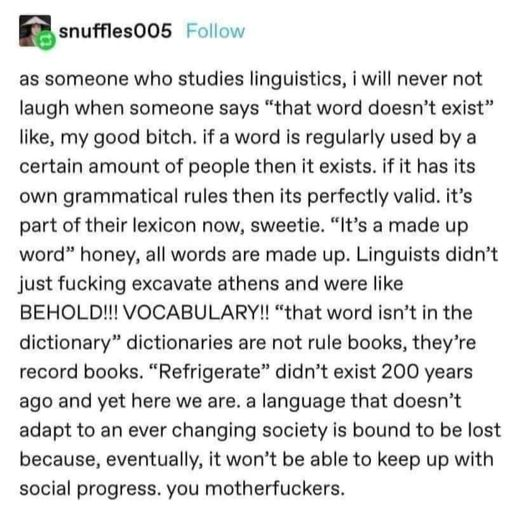this post was submitted on 19 Jul 2024
1269 points (95.7% liked)
Science Memes
11189 readers
2995 users here now
Welcome to c/science_memes @ Mander.xyz!
A place for majestic STEMLORD peacocking, as well as memes about the realities of working in a lab.

Rules
- Don't throw mud. Behave like an intellectual and remember the human.
- Keep it rooted (on topic).
- No spam.
- Infographics welcome, get schooled.
This is a science community. We use the Dawkins definition of meme.
Research Committee
Other Mander Communities
Science and Research
Biology and Life Sciences
- !abiogenesis@mander.xyz
- !animal-behavior@mander.xyz
- !anthropology@mander.xyz
- !arachnology@mander.xyz
- !balconygardening@slrpnk.net
- !biodiversity@mander.xyz
- !biology@mander.xyz
- !biophysics@mander.xyz
- !botany@mander.xyz
- !ecology@mander.xyz
- !entomology@mander.xyz
- !fermentation@mander.xyz
- !herpetology@mander.xyz
- !houseplants@mander.xyz
- !medicine@mander.xyz
- !microscopy@mander.xyz
- !mycology@mander.xyz
- !nudibranchs@mander.xyz
- !nutrition@mander.xyz
- !palaeoecology@mander.xyz
- !palaeontology@mander.xyz
- !photosynthesis@mander.xyz
- !plantid@mander.xyz
- !plants@mander.xyz
- !reptiles and amphibians@mander.xyz
Physical Sciences
- !astronomy@mander.xyz
- !chemistry@mander.xyz
- !earthscience@mander.xyz
- !geography@mander.xyz
- !geospatial@mander.xyz
- !nuclear@mander.xyz
- !physics@mander.xyz
- !quantum-computing@mander.xyz
- !spectroscopy@mander.xyz
Humanities and Social Sciences
Practical and Applied Sciences
- !exercise-and sports-science@mander.xyz
- !gardening@mander.xyz
- !self sufficiency@mander.xyz
- !soilscience@slrpnk.net
- !terrariums@mander.xyz
- !timelapse@mander.xyz
Memes
Miscellaneous
founded 2 years ago
MODERATORS
you are viewing a single comment's thread
view the rest of the comments
view the rest of the comments

And still I maintain that "alot" is not a word.
My favorite reference to "alot"
Mine, too! I hope Allie is doing well these days.
She made a reddit comment a couple months ago
https://old.reddit.com/user/OtherTubemonster/
God i love alot
I've noticed a tendency of people to combine words that are frequently seen together: "alot", "aswell", "noone", etc.
Some of these catch on, like "nevertheless" and "whatsoever". Maybe eventually "alot" and "noone" will become standard English, too.
The way alot, aswell and noone are combining is expected given how many other words we don't bat an eye at went the same way. "another" is the perfect example, it's just "an other" combined.
It's sort of the reverse of what happened to words like apron and newt.
The division and bracketing of phrases changes over time.
"An apron" is the modern usage of the word "napron", and a newt was originally called an eute. The grammatical need for "a" and/or "an" resulted in the root word being rebracketed and changed.
Apart/a part is another one.
"Apart" and "a part" are opposites, though. If you're a part of something, you can't be apart from it.
Yes, and increasing number of people are using the former to mean latter.
it's all just made up. you can see old writings without spacing. or punctuation. you can't even define what's really a word universally. people just decided what's what and standardized it at one point just for some consistency. that doesn't mean things won't change; they most definitely will.
I recall "noone" being taught as acceptable by my english teacher back in 2004. That being said, she's also said some things that ended up being very wrong
Whenever someone says “Noone wanted this” I always picture a big Irishman who has a deep appreciation for stuff Internet people are against.
I always imagine Peter Noone of Herman's Hermits whenever someone does that.
"Noone thinks I have a lovely daughter." Yes, Mrs. Brown. Noone does.
No body writes noone as one word because there's a similar word written that way.
I feel like that sort of misses the point. That really has to do with how we transcribe verbal speech into written. "A lot" is absolutely a phrase, I don't imagine you'd disagree with that.
Frankly this wouldn’t be a problem if it weren’t for “another”
Which some who use "alot" consider as two words.
That has to do with the definition of what a word even is (an open problem!). "Alot" is clearly made up of two separate units, but so is "anyway". I think a lot of people don't like this one because it's simply unnecessary. You need "anyway" to show that the two words are not stressed separately, but treated as one unit, whereas with "a lot" this is already obvious ("a" is almost never stressed).
Also has to do with English spelling just being bad, generally.
I think spellings and punctuation are still valid. Mostly. Ignore variations between English and Americanese.
In not the Americans' fault that the English decided to butcher their own language after the US kicked them out
England and all its former colonies (except the American ones) agree on the language, and the only odd one out - the United States feels it is unique among former colonies and its parent nation as the sole owner of the most correct version of English.
Seems likely /s
I know this is all a joke, but Canada doesn't share the UK's... proclivities with language